-
 Bitcoin
Bitcoin $117500
-0.28% -
 Ethereum
Ethereum $3558
0.05% -
 XRP
XRP $3.392
-1.64% -
 Tether USDt
Tether USDt $1.000
-0.04% -
 BNB
BNB $728.3
-0.65% -
 Solana
Solana $175.4
-0.82% -
 USDC
USDC $0.9998
-0.01% -
 Dogecoin
Dogecoin $0.2398
1.83% -
 TRON
TRON $0.3179
-2.38% -
 Cardano
Cardano $0.8204
-0.07% -
 Hyperliquid
Hyperliquid $44.07
-0.62% -
 Stellar
Stellar $0.4581
-1.03% -
 Sui
Sui $3.790
0.35% -
 Chainlink
Chainlink $18.16
1.68% -
 Hedera
Hedera $0.2643
-0.28% -
 Avalanche
Avalanche $24.22
2.25% -
 Bitcoin Cash
Bitcoin Cash $512.2
-0.43% -
 Shiba Inu
Shiba Inu $0.00001479
0.54% -
 Litecoin
Litecoin $111.1
8.86% -
 UNUS SED LEO
UNUS SED LEO $8.986
0.08% -
 Toncoin
Toncoin $3.194
-0.68% -
 Polkadot
Polkadot $4.337
1.87% -
 Uniswap
Uniswap $10.02
-1.95% -
 Monero
Monero $321.7
1.05% -
 Ethena USDe
Ethena USDe $1.001
-0.04% -
 Bitget Token
Bitget Token $4.870
0.73% -
 Pepe
Pepe $0.00001325
1.35% -
 Dai
Dai $0.9999
0.00% -
 Aave
Aave $314.1
-2.09% -
 Cronos
Cronos $0.1203
1.58%
Why was the ETH ETF approved?
The approval of the Ethereum ETF reflects growing institutional demand, improved regulatory oversight, and Ethereum's maturation as a secure and versatile digital asset.
Jul 20, 2025 at 01:07 am
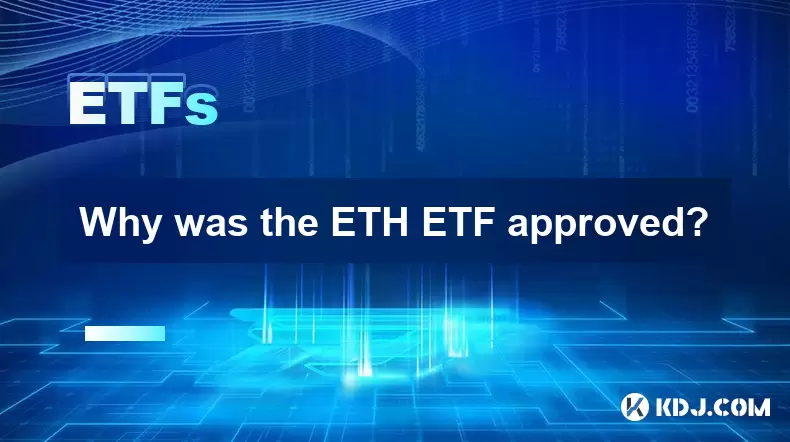
Regulatory Environment and Market Demand
The approval of the Ethereum (ETH) Exchange-Traded Fund (ETF) stems from a confluence of regulatory developments and increasing institutional demand for accessible cryptocurrency investment vehicles. Over recent years, regulators have been cautious about approving crypto-based ETFs due to concerns around market manipulation, liquidity, and custody solutions. However, as Ethereum matured into a more established asset class with growing adoption and clearer legal frameworks in certain jurisdictions, regulators began showing openness to such products.
One key factor behind the approval lies in the improved oversight mechanisms introduced by financial authorities. Regulators worked closely with fund providers to ensure that the underlying ETH markets were robust enough to support an ETF structure. This included enhanced surveillance systems to detect and prevent fraudulent activities. Additionally, custodial infrastructure for digital assets became more secure and compliant, which addressed one of the primary concerns raised during earlier denials of crypto ETF proposals.
Market demand also played a pivotal role in the approval process. Institutional investors increasingly sought exposure to Ethereum without the complexities of directly holding and securing digital assets. An ETH ETF offered them a familiar and regulated investment vehicle, enabling seamless integration into traditional portfolios. The success and growing acceptance of Bitcoin ETFs further demonstrated investor appetite for crypto-backed exchange-traded products, paving the way for Ethereum’s inclusion.
Ethereum's Position in the Crypto Ecosystem
Ethereum's unique value proposition within the broader cryptocurrency ecosystem significantly influenced the decision to approve its ETF. Unlike many other digital assets, Ethereum serves as both a currency and a decentralized computing platform, supporting smart contracts and a vast array of decentralized applications (dApps). This dual utility has led to consistent demand for ETH, not just as an investment asset but also as fuel for network transactions and decentralized finance (DeFi) protocols.
Moreover, Ethereum underwent several major upgrades, most notably the transition to a proof-of-stake consensus mechanism through The Merge upgrade. This shift not only reduced the network’s energy consumption dramatically but also introduced new economic dynamics by enabling ETH holders to earn staking rewards. These enhancements contributed to Ethereum’s increased legitimacy as a long-term investment asset rather than a speculative token.
Additionally, Ethereum’s ecosystem continues to expand, with billions of dollars locked in DeFi platforms, non-fungible token (NFT) marketplaces, and Web3 projects built on its blockchain. The resilience and scalability improvements brought by layer-2 solutions like Optimism and Arbitrum further solidified Ethereum’s position as a foundational layer for decentralized innovation. These factors made it a compelling candidate for ETF inclusion compared to other altcoins with less clear use cases or development roadmaps.
Institutional Support and Product Development
The push for an Ethereum ETF was backed by strong institutional interest and strategic product development efforts from major asset managers. Companies like BlackRock, Fidelity, and Ark Invest submitted proposals and engaged in extensive dialogue with regulators to address compliance and operational challenges associated with crypto ETFs. Their involvement lent credibility to the product and reassured regulators about the seriousness and professionalism surrounding its launch.
Asset managers also invested heavily in building robust trading, custody, and valuation mechanisms tailored specifically for Ethereum-backed funds. These infrastructural advancements ensured that the ETF could accurately track Ethereum’s price while maintaining transparency and auditability. The ability to provide real-time pricing data, coupled with stringent risk management practices, helped alleviate concerns regarding potential market distortions or mispricing.
Furthermore, these institutions emphasized the importance of investor protection and education when introducing complex financial instruments like crypto ETFs. They developed comprehensive disclosure documents and risk assessments to inform potential investors about the nuances of investing in Ethereum via an ETF. This proactive approach fostered greater trust among regulators and paved the way for eventual approval.
Global Precedents and Competitive Pressure
The approval of the ETH ETF was also influenced by global precedents and competitive pressures within the financial industry. Several countries, including Canada and Germany, had already approved Ethereum ETFs or similar products before the U.S. regulatory greenlight. These international approvals provided empirical evidence that such products could operate effectively under appropriate oversight, reducing skepticism among regulators in other jurisdictions.
Simultaneously, the growing popularity of over-the-counter (OTC) crypto derivatives and offshore ETFs created pressure on domestic regulators to offer comparable products locally. Investors were increasingly seeking access to Ethereum through regulated channels, and delaying approval risked pushing capital offshore or into less transparent alternatives. By approving the ETH ETF, regulators acknowledged this reality and aimed to bring more oversight and legitimacy to the space.
In addition, exchanges and brokerages began integrating Ethereum futures and options markets, demonstrating sufficient depth and liquidity to support ETF structures. The presence of mature derivative markets allowed for better hedging and arbitrage opportunities, ensuring that the ETF could function efficiently without distorting spot prices. This development further reinforced the feasibility of launching an Ethereum ETF in a controlled environment.
Technological Maturity and Investor Confidence
Technological maturity played a crucial role in securing the approval of the Ethereum ETF. As Ethereum evolved, so did the tools and services surrounding it. Wallet providers, custodians, and exchanges implemented advanced security measures, including multi-signature wallets, cold storage solutions, and insurance mechanisms. These enhancements significantly reduced the risks associated with storing and transacting Ethereum, making it more palatable for institutional adoption.
Investor confidence also grew as Ethereum demonstrated resilience against network attacks and outages. Its continued operation through multiple market cycles and high congestion periods showcased the reliability of the underlying blockchain. Furthermore, the Ethereum Foundation and core developers maintained active communication with stakeholders, providing regular updates and addressing vulnerabilities promptly. This level of transparency and responsiveness contributed to a more favorable perception of Ethereum as an investable asset.
Lastly, the introduction of tokenized versions of ETH on traditional financial networks enabled smoother integration with existing systems. These innovations allowed for easier settlement and reconciliation processes within ETF structures, aligning them more closely with conventional financial instruments. The combination of technological progress and heightened investor confidence ultimately supported the case for Ethereum ETF approval.
Frequently Asked Questions (FAQ)
Q1: How does an Ethereum ETF differ from directly owning ETH?
An Ethereum ETF allows investors to gain exposure to ETH without needing to manage private keys or interact directly with cryptocurrency exchanges. It is traded on traditional stock exchanges and offers added convenience, security, and regulatory oversight compared to self-custodying digital assets.
Q2: Are Ethereum ETFs available globally?
Several countries, including Canada, Germany, and Brazil, have approved Ethereum ETFs or similar products. Availability depends on local regulations and the approval status granted by financial authorities in each jurisdiction.
Q3: What fees are associated with Ethereum ETFs?
Fees vary depending on the provider and structure of the ETF. Common costs include management fees, custody fees, and transaction expenses. Investors should review the prospectus to understand all applicable charges before investing.
Q4: Can I redeem shares of an Ethereum ETF for actual ETH?
Most Ethereum ETFs do not allow direct redemption of shares for physical ETH. Instead, they track the price of ETH through futures contracts or synthetic instruments. Investors looking for direct ownership may prefer using a regulated crypto exchange instead.
Disclaimer:info@kdj.com
The information provided is not trading advice. kdj.com does not assume any responsibility for any investments made based on the information provided in this article. Cryptocurrencies are highly volatile and it is highly recommended that you invest with caution after thorough research!
If you believe that the content used on this website infringes your copyright, please contact us immediately (info@kdj.com) and we will delete it promptly.
- SUI Altcoin: Primed for Potential 100x Gains?
- 2025-07-20 04:50:12
- Bitcoin Halving, Macro Drivers, and Tim Draper: A Perfect Storm?
- 2025-07-20 05:30:12
- Panicked, Child, Swallowed Coin: A Parent's Worst Nightmare (and What to Do)
- 2025-07-20 04:35:12
- Binance Coin (BNB) Price Prediction: Resistance Break Signals Bullish Momentum
- 2025-07-20 05:30:12
- XRP Soars to Seven-Year High: Is This the Real Deal?
- 2025-07-20 05:50:12
- WLFI Token Tradability: World Liberty Finance's Bold Move Under Trump's Crypto Wing
- 2025-07-20 04:50:12
Related knowledge
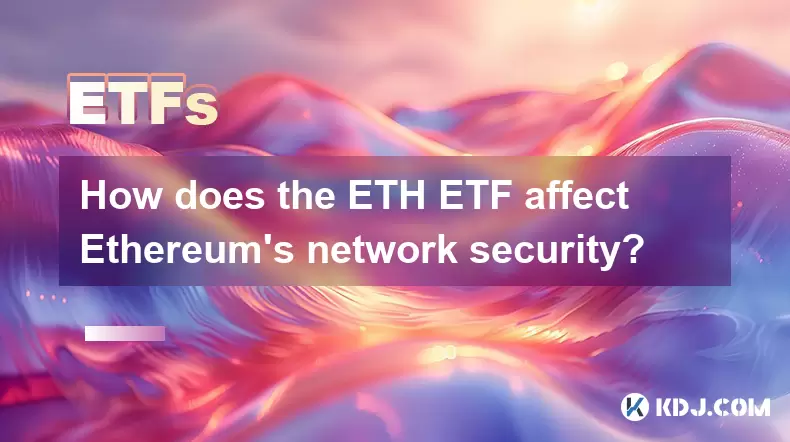
How does the ETH ETF affect Ethereum's network security?
Jul 17,2025 at 01:29pm
Understanding the ETH ETF ConceptAn Ethereum Exchange-Traded Fund (ETH ETF) is a financial product that allows investors to gain exposure to Ethereum ...
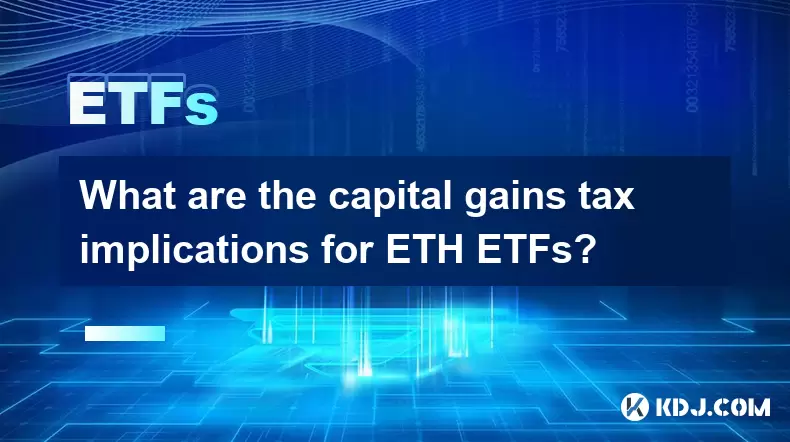
What are the capital gains tax implications for ETH ETFs?
Jul 18,2025 at 08:00am
Understanding Capital Gains Tax in Cryptocurrency InvestmentsCapital gains tax is a tax imposed on the profit realized from the sale of an asset that ...
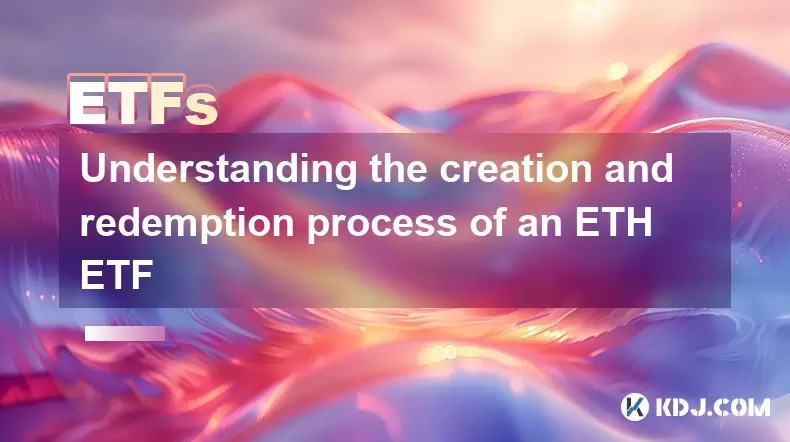
Understanding the creation and redemption process of an ETH ETF
Jul 19,2025 at 07:36am
What is an ETH ETF?An ETH ETF (Ethereum Exchange-Traded Fund) is a financial product designed to track the price of Ethereum without requiring investo...

How to analyze which ETH ETF is the best choice
Jul 19,2025 at 05:01pm
Understanding ETH ETFs and Their RelevanceEthereum Exchange-Traded Funds (ETFs) have emerged as a popular investment vehicle for those seeking exposur...
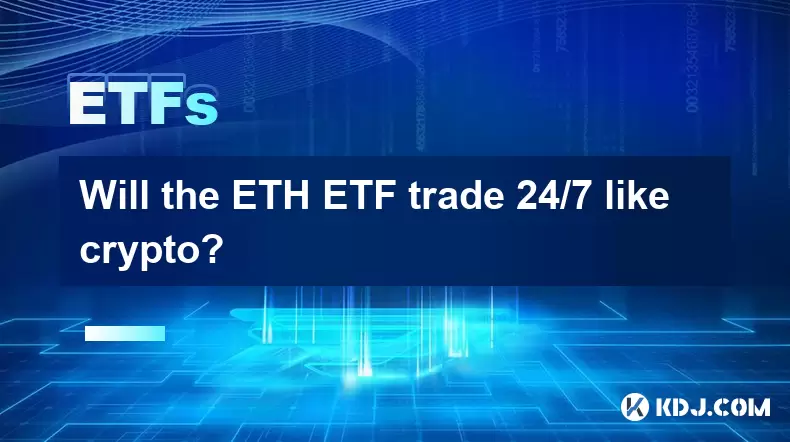
Will the ETH ETF trade 24/7 like crypto?
Jul 18,2025 at 10:00am
Understanding the ETH ETF and Its Trading HoursThe Ethereum Exchange-Traded Fund (ETH ETF) is a financial product that allows investors to gain exposu...
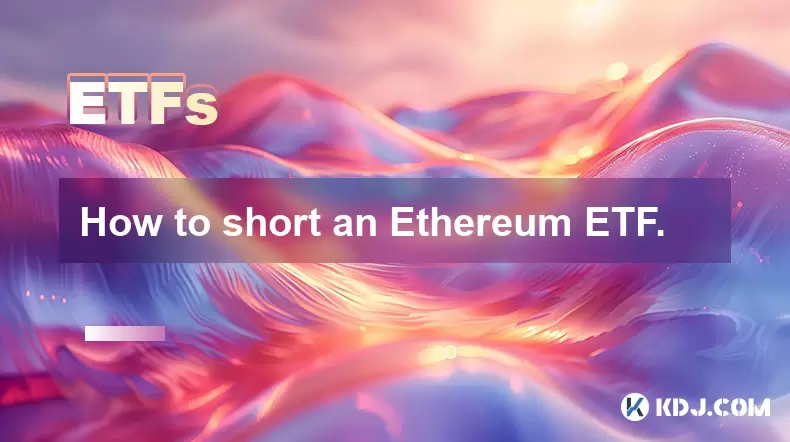
How to short an Ethereum ETF.
Jul 17,2025 at 05:43pm
Understanding the Concept of Shorting an Ethereum ETFShorting an Ethereum ETF involves betting against the price of Ethereum through a specific exchan...

How does the ETH ETF affect Ethereum's network security?
Jul 17,2025 at 01:29pm
Understanding the ETH ETF ConceptAn Ethereum Exchange-Traded Fund (ETH ETF) is a financial product that allows investors to gain exposure to Ethereum ...

What are the capital gains tax implications for ETH ETFs?
Jul 18,2025 at 08:00am
Understanding Capital Gains Tax in Cryptocurrency InvestmentsCapital gains tax is a tax imposed on the profit realized from the sale of an asset that ...

Understanding the creation and redemption process of an ETH ETF
Jul 19,2025 at 07:36am
What is an ETH ETF?An ETH ETF (Ethereum Exchange-Traded Fund) is a financial product designed to track the price of Ethereum without requiring investo...

How to analyze which ETH ETF is the best choice
Jul 19,2025 at 05:01pm
Understanding ETH ETFs and Their RelevanceEthereum Exchange-Traded Funds (ETFs) have emerged as a popular investment vehicle for those seeking exposur...

Will the ETH ETF trade 24/7 like crypto?
Jul 18,2025 at 10:00am
Understanding the ETH ETF and Its Trading HoursThe Ethereum Exchange-Traded Fund (ETH ETF) is a financial product that allows investors to gain exposu...

How to short an Ethereum ETF.
Jul 17,2025 at 05:43pm
Understanding the Concept of Shorting an Ethereum ETFShorting an Ethereum ETF involves betting against the price of Ethereum through a specific exchan...
See all articles

























































































